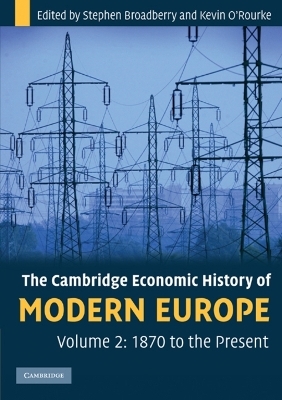
The Cambridge Economic History of Modern Europe: Volume 2, 1870 to the Present
Cambridge University Press (Verlag)
978-0-521-70839-5 (ISBN)
Unlike most existing textbooks on the economic history of modern Europe, which offer a country-by-country approach, The Cambridge Economic History of Modern Europe rethinks Europe's economic history since 1700 as unified and pan-European, with the material organized by topic rather than by country. This second volume tracks Europe's economic history through three major phases since 1870. The first phase was an age of globalization and of European economic and political dominance that lasted until the First World War. The second, from 1914 to 1945, was one of war, deglobalization, and depression and the third was one of growing integration not only within Europe but also between Europe and the global economy. Leading authors offer comprehensive and accessible introductions to these patterns of globalization and deglobalization as well as to key themes in modern economic history such as economic growth, business cycles, sectoral developments, and population and living standards.
Stephen Broadberry is Professor of Economic History at the University of Warwick and a co-ordinator of the Economic History Initiative at the Centre for Economic and Policy Research. His recent publications include The Economics of World War I (2005, as co-editor) and Market Services and the Productivity Race, 1850–2000: Britain in International Perspective (2006). Kevin O'Rourke is Professor of Economics at Trinity College Dublin and a co-organiser of the Centre for Economic and Policy Research's Economic History Initiative. His recent publications include The International Trading System, Globalization and History, 2 volumes, (as editor, 2005) and Power and Plenty: Trade, War, and the World Economy in the Second Millennium (2007, with Ronald Findlay).
Introduction; Part I. Before the First World War: 1. Globalization, 1870–1914 Guillaume Daudin, Matthias Morys and Kevin H. O'Rourke; 2. Aggregate growth, 1870–1914: growing at the production frontier Albert Carreras and Camilla Josephson; 3. Sectoral developments, 1870–1914 Stephen Broadberry, Giovanni Federico and Alexander Klein; 4. Business cycles, 1870–1914 Marc Flandreau, Juan Flores, Clemens Jobst and David Khoudour-Casteras; 5. Population and living standards, 1870–1914 Carol Leonard and Jonas Ljungberg; Part II. The World Wars and the Interwar Period: 6. War and disintegration, 1914–50 Jari Eloranta and Mark Harrison; 7. Business cycles and economic policy, 1914–45 Albrecht Ritschl and Tobias Straumann; 8. Aggregate growth, 1913–50 Joan R. Roses and Nikolaus Wolf; 9. Sectoral developments, 1914–45 Erik Buyst and Piotr Franaszek; 10. Population and living standards, 1914–45 Robert Millward and Joerg Baten; Part III. From the Second World War to the Present: 11. The economic impact of European integration Barry Eichengreen and Andrea Boltho; 12. Aggregate growth, 1950–2005 Nicholas Crafts and Gianni Toniolo; 13. Sectoral developments, 1945–2000 Stefan Houpt, Pedro Lains and Lennart Schön; 14. Business cycles and economic policy, 1945–2007 Stefano Battilossi, James Foreman-Peck and Gerhard Kling; 15. Population and living standards, 1945–2005 Dudley Baines, Neil Cummins and Max-Stephan Schulze.
| Erscheint lt. Verlag | 24.6.2010 |
|---|---|
| Reihe/Serie | The Cambridge Economic History of Modern Europe ; Vol.2 |
| Zusatzinfo | 102 Tables, unspecified; 3 Maps |
| Verlagsort | Cambridge |
| Sprache | englisch |
| Maße | 173 x 246 mm |
| Gewicht | 940 g |
| Themenwelt | Geisteswissenschaften ► Geschichte ► Allgemeines / Lexika |
| Geisteswissenschaften ► Geschichte ► Regional- / Ländergeschichte | |
| Geschichte ► Teilgebiete der Geschichte ► Wirtschaftsgeschichte | |
| ISBN-10 | 0-521-70839-7 / 0521708397 |
| ISBN-13 | 978-0-521-70839-5 / 9780521708395 |
| Zustand | Neuware |
| Informationen gemäß Produktsicherheitsverordnung (GPSR) | |
| Haben Sie eine Frage zum Produkt? |
aus dem Bereich


